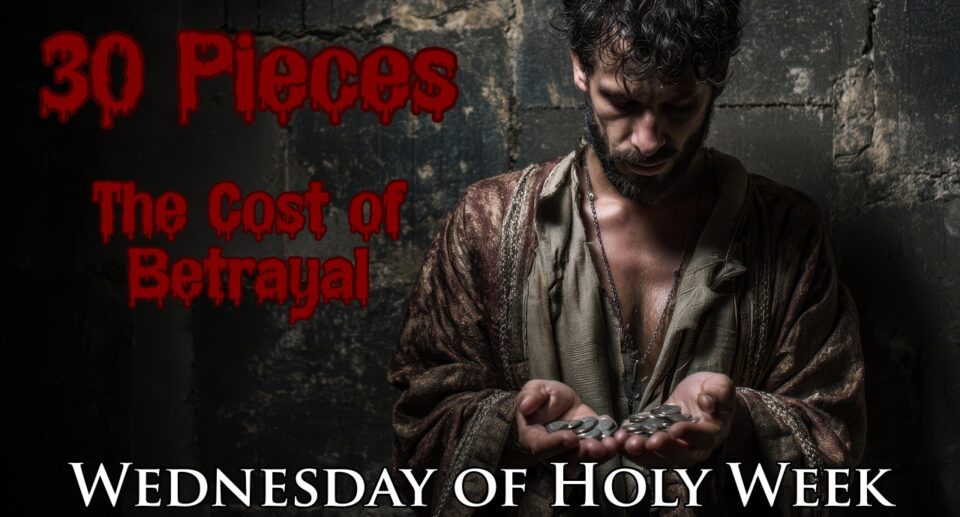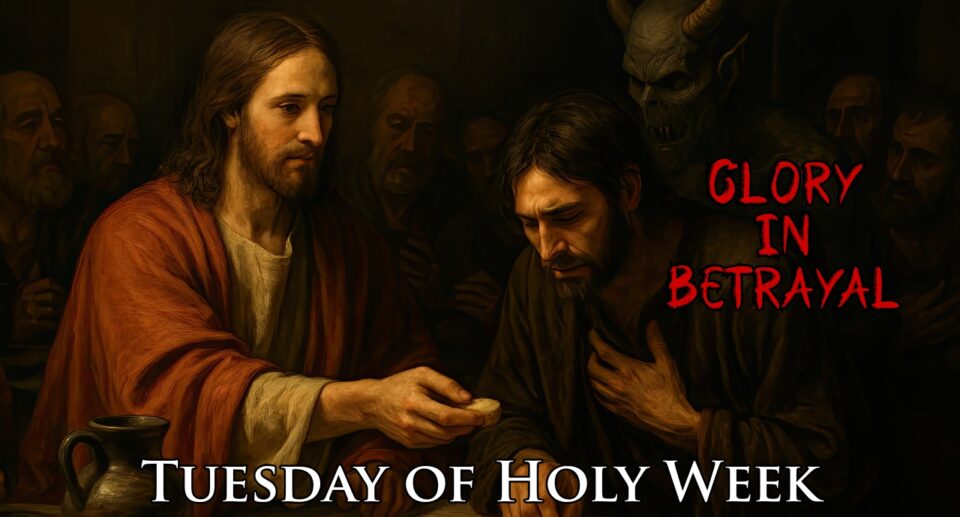Thirty Pieces: The Price of Betrayal and the Cost of Love | Daily Readings | April 16, 2025

When Judas asked, “What are you willing to give me if I hand him over to you?” he reduced the Son of God to a commodity. Today’s powerful Holy Week reflection explores the stark reality of betrayal and the astonishing faithfulness of the One betrayed.
Through this reflection, you’ll discover:
- The biblical significance of thirty pieces of silver and its connection to slavery
- How to recognize and confront the “Judas-tendencies” in our own hearts
- Why Jesus continued breaking bread with the one who would betray him
- How divine love transforms rejection into the very means of salvation
Readings covered: Isaiah 50:4-9a; Psalm 69:8-10, 21-22, 31, 33-34; Matthew 26:14-25
Perfect for anyone preparing for the Triduum, struggling with rejection or betrayal, or seeking deeper understanding of the sacrificial love at the heart of Holy Week.
#HolyWeek #SilentWednesday #JudasBetrayal #SacrificialLove #SufferingServant #ThirtyPieces #LentenJourney
Thirty Pieces: The Price of Betrayal and the Cost of Love
Silver clinked against silver as the coins passed from priestly hands to trembling fingers. Thirty pieces. The standard price of a slave. The agreed-upon value of the Son of God.
“What are you willing to give me if I hand him over to you?”
With these words, recorded in today’s Gospel, Judas transforms from disciple to mercenary. The question reveals the transactional nature of his relationship with Jesus—no longer one of devotion but of profit and loss.
He had watched Jesus for three years. Witnessed healings, heard teachings, seen storms calmed and thousands fed. Yet somehow, he had never truly seen Jesus at all. The treasurer of the group had reduced the Messiah to a commodity, the Savior to a silver exchange.
Thirty pieces of silver. In Exodus, this was the price paid to the owner of a slave gored by an ox. In Zechariah, it was the insulting sum offered to the prophet as wages, which he threw back into the temple treasury. Now it becomes the price tag attached to God incarnate.
As we enter the final days before the Triduum begins, today’s readings confront us with the stark reality of betrayal alongside the astonishing faithfulness of the One betrayed. They invite us to examine both the Judas-tendencies in our own hearts and the Christ-like capacity to remain faithful even when surrounded by treachery.
Matthew’s Gospel account is stark in its simplicity. No psychological explanation is offered for Judas’s decision. No dramatic villain monologue reveals his motivations. Was it greed? Disillusionment? Political calculation? We aren’t told. The mystery of iniquity requires no justification; it simply unfolds in coldly practical terms: “From that time on, he looked for an opportunity to hand him over.”
Yet even as betrayal is arranged in the shadows, Jesus prepares the Passover in the open. Even knowing what—and who—awaits at the table, he proceeds with the sacred meal. The darkness gathers, but it does not deter him from his appointed path.
During the meal, Jesus speaks the unspeakable: “Amen, I say to you, one of you will betray me.” The disciples are “deeply distressed,” each asking, “Surely it is not I, Lord?” Their question reveals both self-doubt and a terrible possibility—that any of them could be capable of such treachery.
Even Judas asks this question, though he addresses Jesus as “Rabbi” rather than “Lord”—a subtle but significant distinction in Matthew’s careful narrative. Jesus answers with the mysterious “You have said so,” neither accusing nor excusing. The table fellowship continues, the betrayer’s hand still sharing the dish with the betrayed.
Today’s first reading from Isaiah provides a prophetic window into Jesus’ internal experience of this betrayal. The Suffering Servant declares: “The Lord GOD has given me a well-trained tongue, that I might know how to speak to the weary a word that will rouse them.” Despite the gathering treachery, Jesus continues his mission of awakening hope in the exhausted, of speaking truth to those deadened by religious formalism.
But this faithful speech provokes violent response: “I gave my back to those who beat me, my cheeks to those who plucked my beard; my face I did not shield from buffets and spitting.”
The servant’s fidelity is met with brutality. His life-giving words are answered with death-dealing violence. Yet he remains resolute: “The Lord GOD is my help, therefore I am not disgraced; I have set my face like flint, knowing that I shall not be put to shame.”
This flint-faced determination carries Jesus through betrayal, abandonment, denial, mockery, torture, and execution. It’s not stoic detachment but unswerving commitment to love’s costly path. While Judas is calculating profit, Jesus is calculating a different cost—the price of redemption paid not in silver but in blood.
Our psalm intensifies this contrast between betrayal’s pain and redemptive love’s persistence. The psalmist laments: “Because for your sake I bear insult, and shame covers my face. I have become an outcast to my brothers, a stranger to my mother’s sons.”
The pain of rejection by those closest to him cuts deeper than any Roman whip. “Insult has broken my heart, and I am weak; I looked for sympathy, but there was none; for comforters, and I found none. Rather they put gall in my food, and in my thirst they gave me vinegar to drink.”
This prophetic description of the crucifixion scene—where Jesus will indeed be offered vinegar for his thirst—reveals the cosmic abandonment embraced for our sake. Yet even here, the psalm pivots to praise: “I will praise the name of God in song, and I will glorify him with thanksgiving.”
Betrayal doesn’t get the last word. Rejection doesn’t define the betrayed. From the depths of abandonment rises a song of praise that transforms suffering into sacrifice, mourning into worship.
What does all this mean for us today?
First, these readings invite us to honest self-examination. The disciples’ question—”Surely not I, Lord?”—must become our own. Rather than pointing fingers at history’s greatest traitor, we must confront the Judas-tendencies in our own hearts.
What is our price? Not literally silver, perhaps, but what do we accept in exchange for compromising our commitment to Christ? Career advancement? Social acceptance? Financial security? Political power? The momentary pleasure of sin? There are a thousand currencies with which our loyalty is purchased daily.
When we reduce Christ to a means to our ends rather than the end himself, we join Judas in the transaction. When we approach faith as a bargain rather than a relationship, we too ask, “What will you give me?”
Second, these readings reveal both the pain of betrayal and the power to endure it faithfully. Jesus doesn’t respond to Judas’s treachery with revenge or even public exposure. He continues breaking bread with the one whose hand is already reaching for the money bag.
This is divine love on full display—not naive about evil but refusing to be defined by it. Not blind to betrayal but seeing beyond it to redemptive possibility. Not denying the pain of rejection but transforming it into the very means of salvation.
How do we respond when betrayed, rejected, or abandoned? Do we retaliate? Withdraw? Despair? Or can we, like Christ, continue extending ourselves in love even when that love is not reciprocated? Can we set our faces “like flint” toward redemptive action even when it costs us dearly?
Third, Isaiah’s Suffering Servant reminds us that while human betrayal is real, so is divine vindication. “See, the Lord GOD is my help… who declares me guilty?” The servant knows that human rejection, no matter how universal, cannot override divine acceptance.
This becomes our anchor when human relationships fail. Our worth is not determined by others’ treatment of us. Our identity is not defined by abandonment or betrayal. Our value was established at creation, confirmed in baptism, and is continuously affirmed by the God who declares, “You are mine.”
As we move toward the sacred Triduum, these readings prepare us to witness the ultimate response to betrayal—not retaliation but redemption. Thirty pieces of silver purchased humanity’s greatest sin. But the currency of divine love—Christ’s freely given life—purchased our salvation.
The hands that took the silver thought they were gaining. The hands that were pierced by nails appeared to be losing. Yet history has rendered its verdict: Judas lost everything in his apparent gain, while Christ’s apparent loss became gain for all humanity.
Silver tarnishes. Bodies decay. But love—sacrificial, self-giving love—endures forever. The price of betrayal was counted out in the temple treasury. The cost of love was paid on Calvary. And love’s currency, unlike silver, appreciates eternally.
As we move through this final day before the Triduum, may we honestly examine what we’ve valued above Christ. May we recognize the many ways we’ve struck bargains with competing loyalties. And may we recommit ourselves to the One whose worth far exceeds thirty pieces of silver—or anything else this world can offer.






